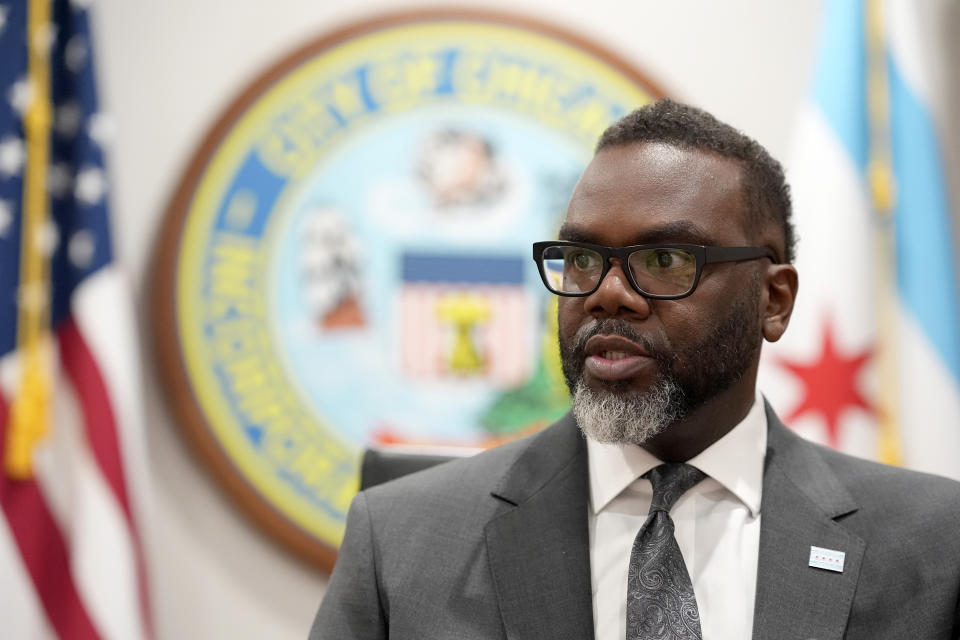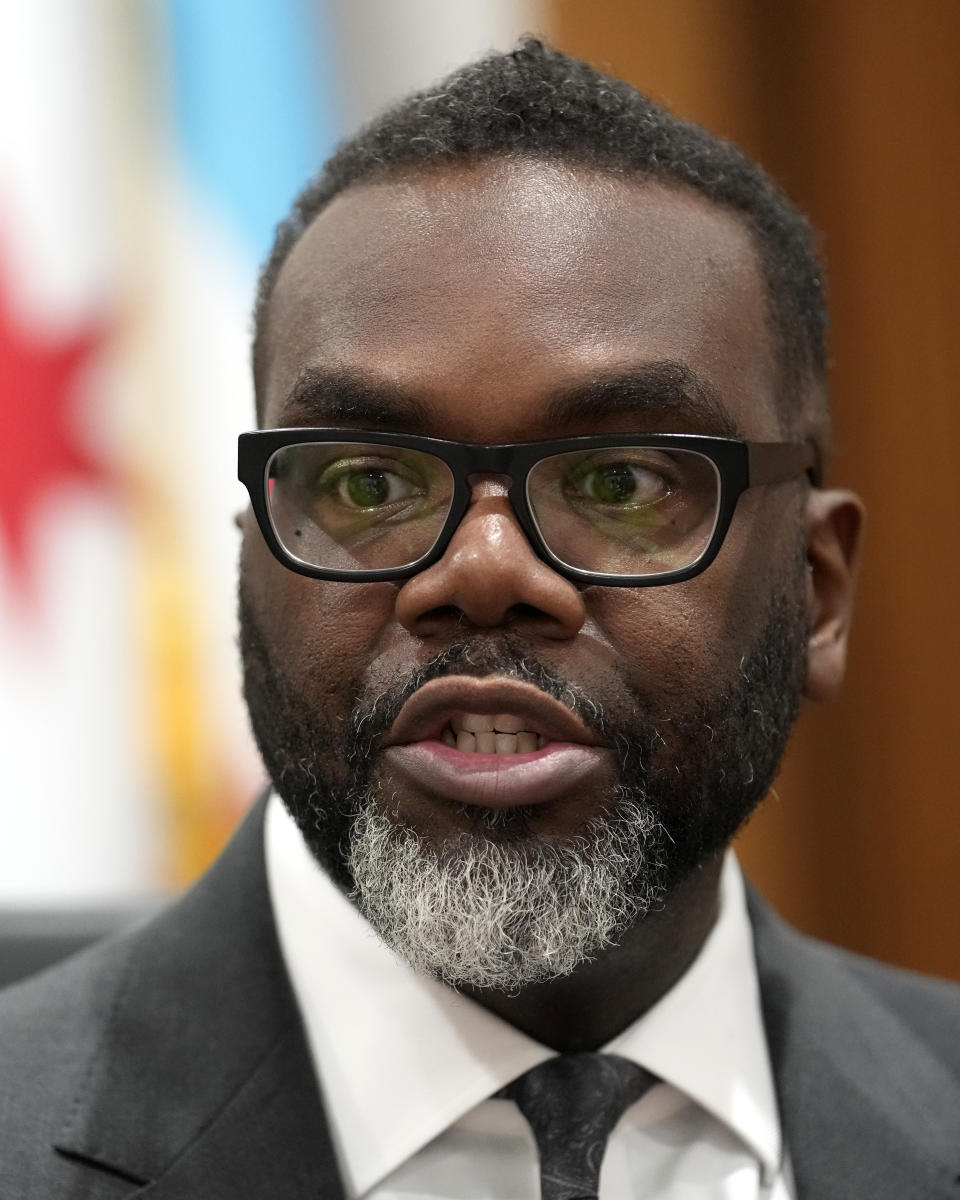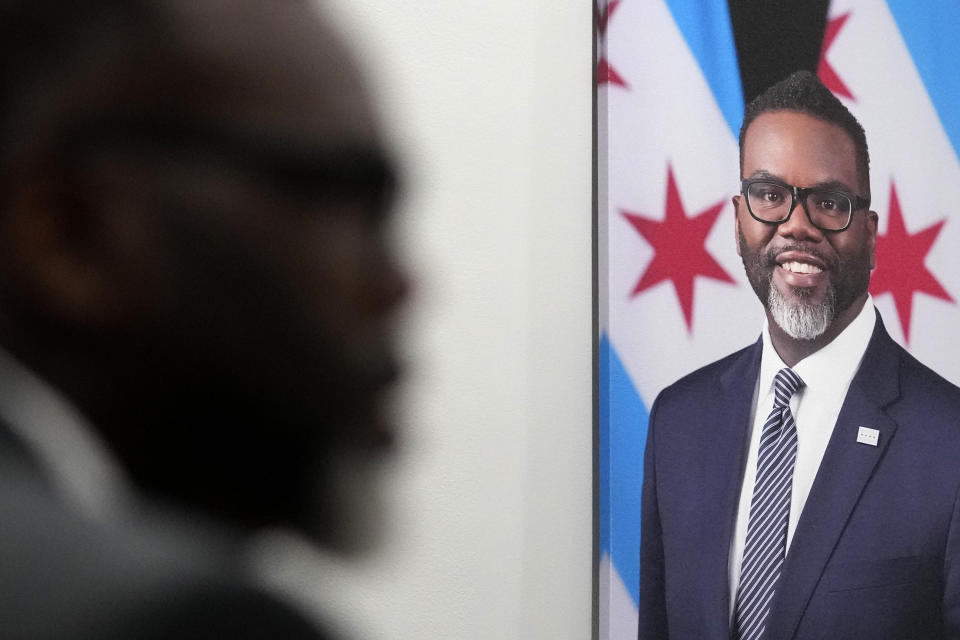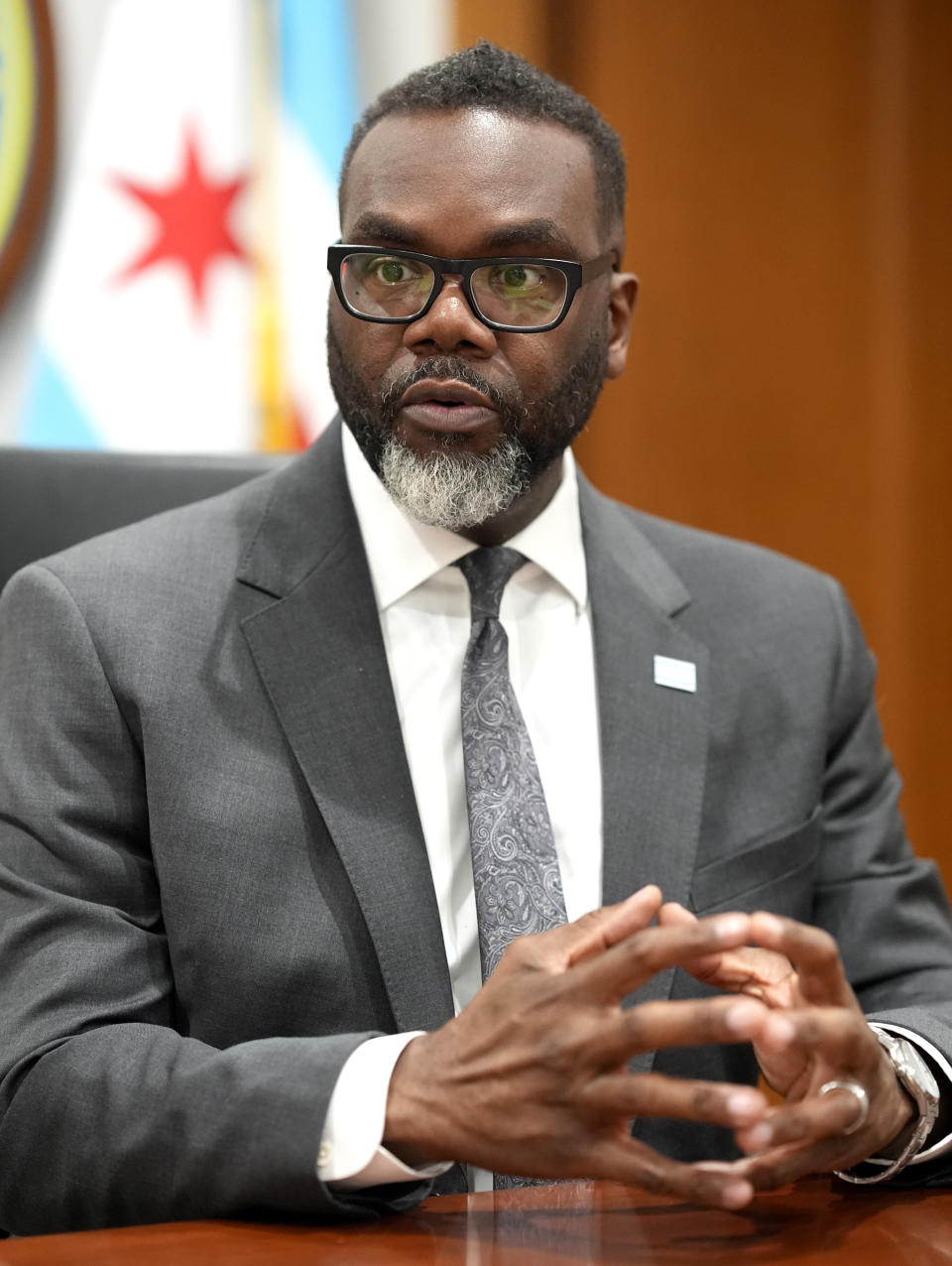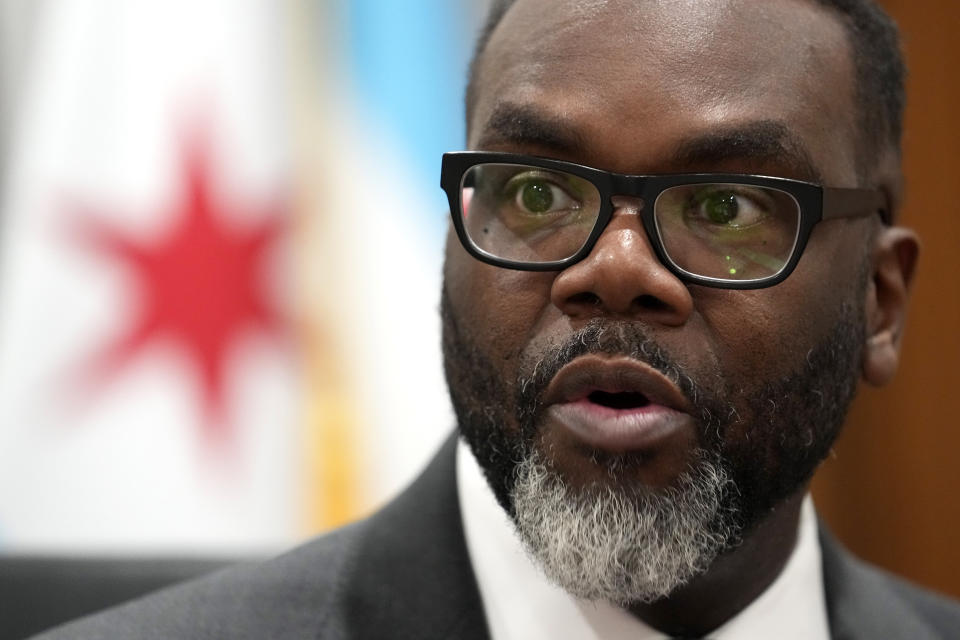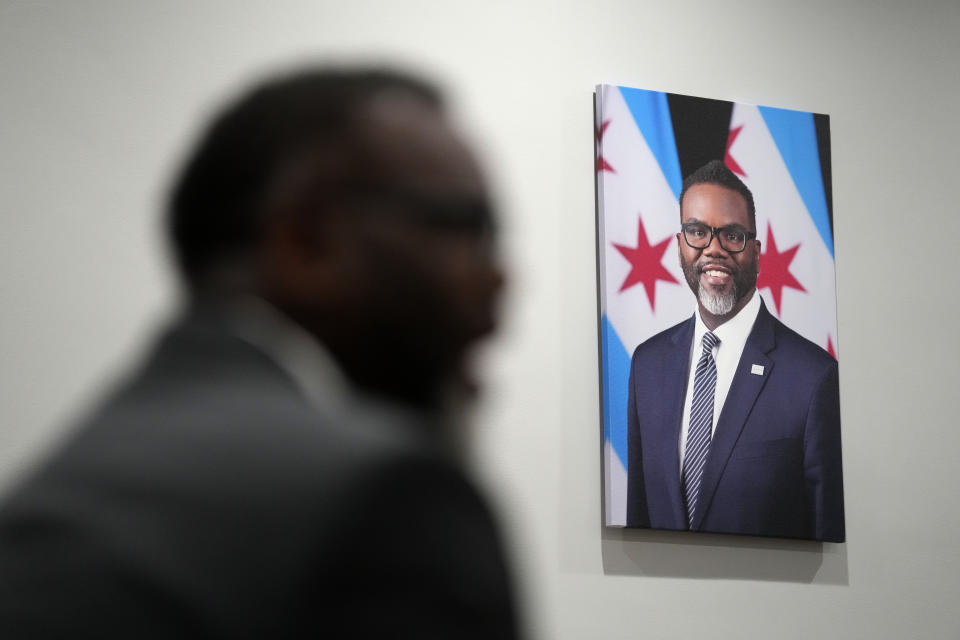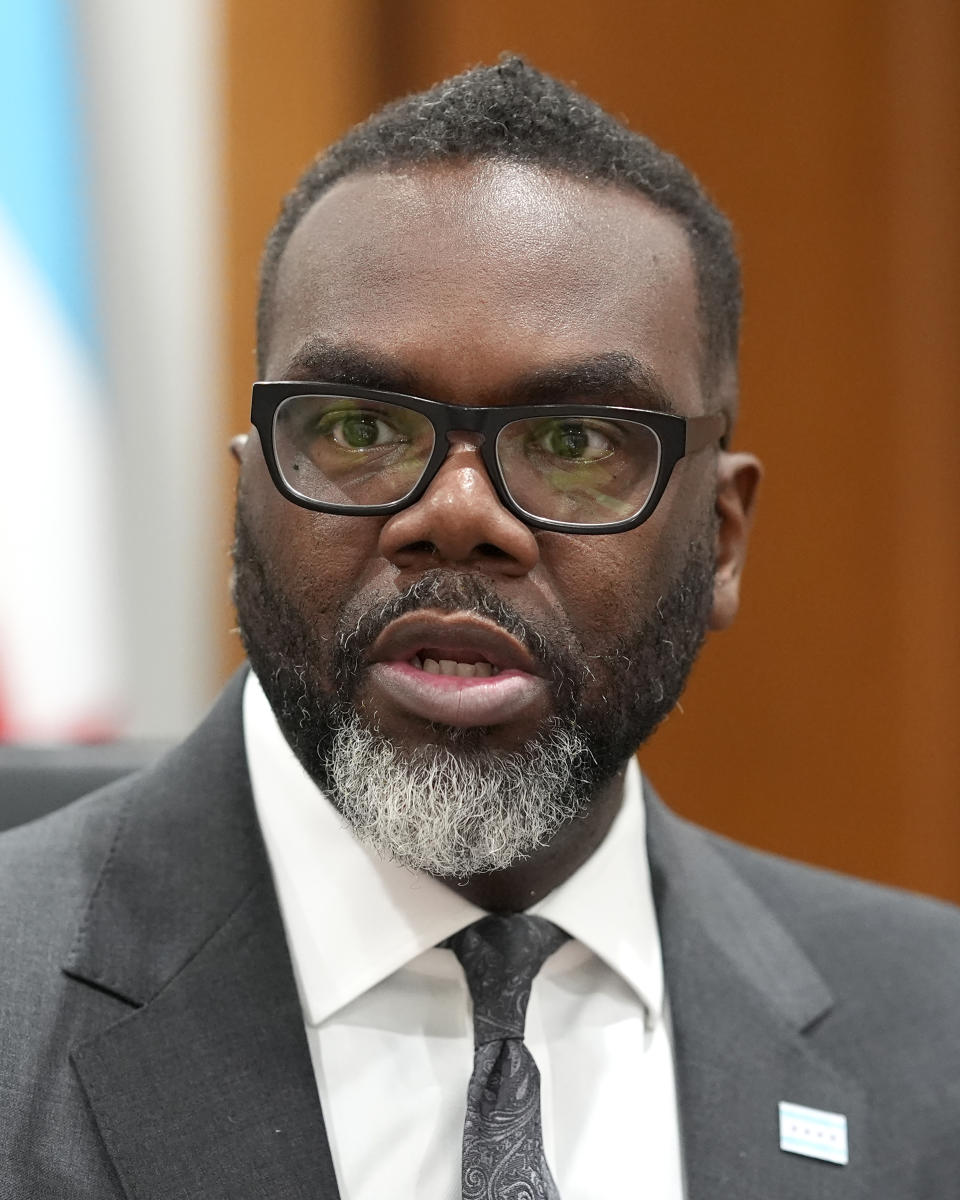Chicago mayor's bumpy first year tests progressive credentials, puzzling some supporters
- Oops!Something went wrong.Please try again later.
CHICAGO (AP) — When union organizer Brandon Johnson was elected Chicago mayor last year, he promised to unroll a “bold progressive movement” in the nation’s third-largest city. A year later, he shocked liberal Democrats by promoting plans for a multibillion dollar Bears stadium using public funds.
The rookie mayor’s first year has been full of bumps, testing his progressive credentials and doing little to win over critics. He has navigated an evolving migrant crisis, budget gaps, persistent crime and a troubled transit system, and while there have been some wins for workers and social services, he has struggled to appease a skeptical business community, police and even fellow Democrats.
By his own rating though, he’s successful.
“The work that we’ve done to build a better, stronger, safer Chicago through the lens of the progressive agenda is unmatched,” he told The Associated Press in a recent interview. “This is the work that I promised that I would do, and I’m doing it.”
He’s quick to highlight his accomplishments: Eliminating subminimum wages for tipped workers by 2028, doubling workers’ paid time off to 10 days, scrapping a controversial gunshot detection system, and working to reopen mental health clinics.
And Johnson says a new stadium is part of his progressive vision that could translate into jobs and opportunities, including hosting a Super Bowl.
Many disagree.
“I was surprised that he came out with such strong support because of all the other things that are going on,” said Patricia Tatum, a retired nurse and housing activist who voted for Johnson. “It’s hard to be empathetic with billion-dollar businesses when you see people can’t afford to pay to rent.”
Johnson, a former teacher’s union organizer and county commissioner, courted a diverse and young electorate as he campaigned with top congressional progressives. His administration hires include union activists and community organizers.
“There are at least conversations of co-governance,” said Kofi Ademola, a founder of anti-gun violence youth group GoodKids MadCity, adding that more cross sections of Chicago have input under Johnson's administration. “We have seen some progress, definitely not enough.”
At 48, Johnson is younger than his predecessors, including former prosecutor Lori Lightfoot and former White House chief of staff Rahm Emanuel. His speaking style is often informal, and he likes to describe challenges as “jacked up situations.”
But his progressive agenda hasn't been fully embraced.
Voters rejected a so-called mansion tax in March, an estimated $100 million revenue source required to improve homeless services as Johnson promised. Political observers say his inexperience and strong opposition messaging hurt the measure’s chances.
“People weren’t sure what the money was going to be used for and didn’t trust the Johnson administration to handle it well,” said political scientist Dick Simpson, author of “Chicago’s Modern Mayors.”
Chicago resident Daniel Boland is so turned off that he has launched a long shot recall effort. If he gets enough signatures for the November ballot and it passes, voters could try to recall Johnson as early as 2026.
Compared with his predecessors, Johnson has been slow to choose his Cabinet. Chicago went months without a public health commissioner and his pick immediately faced a migrant measles outbreak.
Much of Johnson’s tenure has been overshadowed by the migrants' arrival, which began under Lightfoot. More than 40,000 asylum seekers have been sent to Chicago by Texas Gov. Greg Abbott, most coming by bus or plane.
Chicago’s haphazard response was often in the national spotlight, first for using police stations and airports as housing and then for struggling with winter plans. City Council meetings featured explosive public comment. Lawsuits were filed. Johnson squared off with Gov. J.B. Pritzker over funding and shelter sites. Meanwhile, more established immigrants and Black residents say they have been ignored.
The city leaned heavily on volunteers to provide food and medicine, and even though the numbers in shelters are dwindling, migrants' living conditions remain under scrutiny.
“There’s still a lot of difficulty in communicating with the city,” said Dr. Evelyn Figueroa, who runs a food pantry near the city’s largest shelter and has backed student medics.
Johnson's relationship with reporters has been strained. News conferences became combative early on, and he abruptly ended a Sun-Times editorial board meeting in February after learning it would be on the record.
He has also struggled to shape the action at City Hall.
In November, his alderman floor leader stepped down after a heated council meeting. And while the City Council easily approved his first budget, Johnson had to step in twice to cast a tiebreaking vote, including to support a controversial cease-fire resolution, which led to criticism from elected Jewish leaders.
Some say Johnson is simply adapting to the shift from campaigning to governing.
Karen Freeman-Wilson, the former mayor of Gary, Indiana, who now heads the Chicago Urban League, admits she campaigned on promises that she couldn’t keep.
“You don’t know what you can do until you really get into office,” she said. “You have to give those folks who seem to be the most anxious some feedback. For him, that is the business community.”
Johnson has appealed to big business by backing the Bears proposal, rolling out development plans in the LaSalle Street business district and reviving O’Hare International Airport expansion plans.
But business groups, who fought Johnson on paid leave, want more collaboration and say the mayor has to better address perceptions that Chicago remains unsafe when violent crime in the city is down.
“Businesses are still recovering,” said Jack Lavin, president of the Chicagoland Chamber of Commerce. “Downtown, there’s record vacancies. We need to be aware of that in how we look at taxes and businesses.”
The coming months will see some of Johnson's biggest challenges.
He will face his former union during teacher contract negotiations. He has told state leaders that Chicago Public Schools is owed $1 billion because of years of underfunding. And potential candidates for Chicago’s first elected school board are gearing up to run in November.
At the same time, Johnson is preparing for Chicago to take center stage when it hosts the Democratic National Convention this summer, when crime historically rises. Protesters have already filed lawsuits over access and police are undergoing safety training.
“There’s just so much beauty in the city of Chicago,” Johnson said. “For me, it’s important that that is on display.”
